Nsg 210 perfusion - Study guides, Class notes & Summaries
Looking for the best study guides, study notes and summaries about Nsg 210 perfusion? On this page you'll find 16 study documents about Nsg 210 perfusion.
Page 2 out of 16 results
Sort by
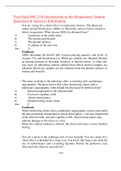
-
Test Bank NSG 210 Introduction to the Respiratory System Questions & Answers & Rationale,100% CORRECT
- Exam (elaborations) • 25 pages • 2022
-
- $17.49
- + learn more
Test Bank NSG 210 Introduction to the Respiratory System Questions & Answers & Rationale 1. You are caring for a client who is in respiratory distress. The physician orders arterial blood gases (ABGs) to determine various factors related to blood oxygenation. What site can ABGs be obtained from? A) A puncture at the radial artery B) The trachea and bronchi C) The pleural surfaces D) A catheter in the arm vein Ans: A Feedback: ABGs determine the blood's pH; oxygen-carrying capacity; and ...
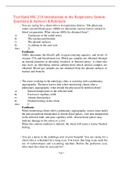
-
Test Bank NSG 210 Introduction to the Respiratory System Questions & Answers & Rationale,100% CORRECT
- Exam (elaborations) • 25 pages • 2022
-
- $17.49
- + learn more
Test Bank NSG 210 Introduction to the Respiratory System Questions & Answers & Rationale 1. You are caring for a client who is in respiratory distress. The physician orders arterial blood gases (ABGs) to determine various factors related to blood oxygenation. What site can ABGs be obtained from? A) A puncture at the radial artery B) The trachea and bronchi C) The pleural surfaces D) A catheter in the arm vein Ans: A Feedback: ABGs determine the blood's pH; oxygen-carrying capacity; and ...
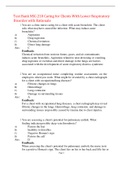
-
Test Bank NSG 210 Caring for Clients With Lower Respiratory Disorder with Rationale,100% CORRECT
- Exam (elaborations) • 23 pages • 2022
-
- $16.99
- + learn more
Test Bank NSG 210 Caring for Clients With Lower Respiratory Disorder with Rationale 1. You are a clinic nurse caring for a client with acute bronchitis. The client asks what may have caused the infection. What may induce acute bronchitis? A) Aspiration B) Drug ingestion C) Chemical irritation D) Direct lung damage Ans: C Feedback: Chemical irritation from noxious fumes, gases, and air contaminants induces acute bronchitis. Aspiration related to near drowning or vomiting, drug ingestion o...
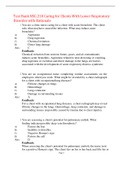
-
Test Bank NSG 210 Caring for Clients With Lower Respiratory Disorder with Rationale,100% CORRECT
- Exam (elaborations) • 23 pages • 2022
- Available in package deal
-
- $16.99
- + learn more
Test Bank NSG 210 Caring for Clients With Lower Respiratory Disorder with Rationale 1. You are a clinic nurse caring for a client with acute bronchitis. The client asks what may have caused the infection. What may induce acute bronchitis? A) Aspiration B) Drug ingestion C) Chemical irritation D) Direct lung damage Ans: C Feedback: Chemical irritation from noxious fumes, gases, and air contaminants induces acute bronchitis. Aspiration related to near drowning or vomiting, drug ingestion o...
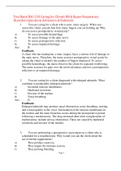
-
Test Bank NSG 210 Caring for Clients With Upper Respiratory Disorders Questions &Answers & Rationale,100% CORRECT
- Exam (elaborations) • 25 pages • 2022
-
- $16.99
- + learn more
Test Bank NSG 210 Caring for Clients With Upper Respiratory Disorders Questions &Answers & Rationale 1. You are caring for a client who is post–sinus surgery. When you assess this client, you ask him how many fingers you are holding up. Why do you assess postoperative visual acuity? A) To assess possible hemorrhage B) To assess damage to the optic nerve C) To assess postoperative infection D) To assess impaired drainage Ans: B Feedback: A client who has undergone a sinus surgery faces ...
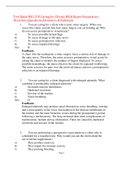
-
Test Bank NSG 210 Caring for Clients With Upper Respiratory Disorders Questions &Answers & Rationale,100% CORRECT
- Exam (elaborations) • 25 pages • 2022
- Available in package deal
-
- $17.49
- + learn more
Test Bank NSG 210 Caring for Clients With Upper Respiratory Disorders Questions &Answers & Rationale 1. You are caring for a client who is post–sinus surgery. When you assess this client, you ask him how many fingers you are holding up. Why do you assess postoperative visual acuity? A) To assess possible hemorrhage B) To assess damage to the optic nerve C) To assess postoperative infection D) To assess impaired drainage Ans: B Feedback: A client who has undergone a sinus surgery faces ...

How much did you already spend on Stuvia? Imagine there are plenty more of you out there paying for study notes, but this time YOU are the seller. Ka-ching! Discover all about earning on Stuvia


